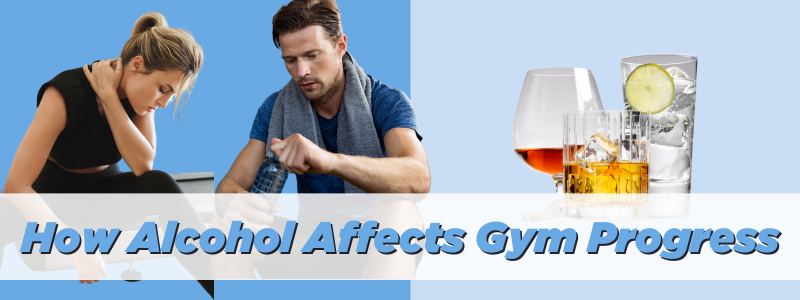Balancing Gym Gains and Alcohol: Excessive drinking can hinder muscle growth, impair recovery, and disrupt fat loss. To maximise your fitness progress, enjoy alcohol in moderation, stay hydrated, and prioritise your workout recovery.
Alcohol can negatively impact your progress in the gym through several mechanisms:
1. Muscle Growth and Repair:
– Inhibits Protein Synthesis: Alcohol reduces muscle protein synthesis, crucial for muscle growth and repair, by interfering with critical pathways.
– Hormonal Effects: Lowers testosterone and increases cortisol, hindering muscle recovery and promoting muscle breakdown.
2. Recovery and Performance:
– Dehydration: Alcohol is a diuretic, leading to dehydration, which impairs muscle function and recovery.
– Sleep Disruption: Alcohol disrupts deep sleep stages essential for recovery, reducing overall workout performance.
3. Metabolism and Fat Loss:
– High Caloric Content: Alcohol is calorie-dense, contributing to a caloric surplus and potentially hindering fat loss.
– Metabolic Prioritization: The body prioritises metabolising alcohol over other nutrients, slowing fat metabolism.
4. Coordination and Safety:
– Impaired Coordination: Alcohol affects the central nervous system, increasing the risk of injury during workouts.
Managing Alcohol Consumption
To balance alcohol and fitness:
– Moderation: Limit to moderate levels
– Timing: Avoid alcohol close to workouts.
– Hydration: Drink plenty of water before and after consuming alcohol.
– Diet: Compensate for alcohol’s calories with a balanced diet.
Moderate, occasional drinking may not drastically affect fitness goals, but frequent or heavy drinking can impede muscle growth, recovery, and fat loss. To optimise gym progress, consume alcohol in moderation and be mindful of its timing and effects on your body.
Need some supplement guide? Check our blog here: https://fitnfearlesspt.com/supplement-recommendations/
—
References
1. Parr, E. B., et al. (2014). Alcohol ingestion impairs post-exercise muscle protein synthesis. *PLoS One, 9*(2), e88384.
2. Vella, L., & Cameron-Smith, D. (2010). Alcohol, athletic performance, and recovery. *Nutrition & Dietetics, 67*(4), 237-241.
3. Hill, E. L., et al. (2003). Effects of alcohol on exercise performance. *Current Sports Medicine Reports, 2*(4), 203-209.


